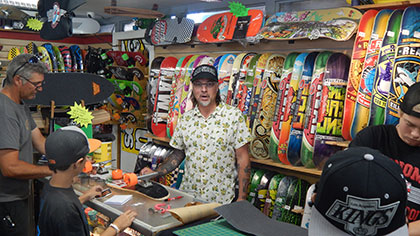Walt Williams –
Think about where retail is headed. Need a bike tire, pair of sunglasses, or groceries just program in your order for instant delivery. Everything to your door in the shortest time possible at the cheapest price possible. This is progress, this is utilizing technology, and this is how smart people shop.
Now imagine a town without retail. What would survive? Think infrastructure, think social interaction, think jobs, think people. Smart? Maybe not so much.
Robert Wilson’s tentacles extend far beyond owning and operating Sonoma Old School skate shop. He provides much more than decks and shoes to the community.
Need a donation for your non-profit’s silent auction? “Sure, how about a board and a couple of shirts and pads and what else do you want?
Want to display a ten-foot art project from your classroom on his front lawn? “No problem.”
Want to develop a pump park next to the skate park so bike riders have their own domain? “Yeah, let’s do it.”
A tech based clubhouse for teens teaching video, dance, art and drama in the afternoons? “On it… teens deserve a place to continue their interests after school.”
Need somebody to monitor and clean the skate park. “Sure.”
Provide a financial incentive for good grades. “Yep.”
Need some unique and straightforward advice on raising kids in Sonoma? “Well, lemme tell ya a little story…”
Rob is such an institution he even has a Robert Wilson Day dedicated to him by the Sonoma City Council.
But what happens if those tentacles go away? Unfortunately, the community loses the whole package, not just decks and shoes.
You can blame Jeff Bezos, CEO and founder of Amazon, Time magazine’s person of the year in 1999 and the father of e-commerce. Sales of $67.9 billion last year had to come from somewhere. Or you can blame Alibaba, the Chinese master of e-commerce, which generated twice the sales of Amazon last year. Or blame the Walmart-izing of retail, as in bigger is better.
But really you should blame yourself because these companies are just taking advantage of consumer desire. Providing a service for an apparently insatiable need for the needs (remember The Lorax) at the cheapest price possible.
We have 26 tasting rooms in the plaza not because of some secret wine conspiracy but because the market supports people visiting those tasting rooms.
“I get people who will find the item on their smartphones then expect me to match the price,” explained Rob, “Or the worst is when they try on a pair of sunglasses then ask me for the item number. That one kills me.” This is called Showrooming; it sounds like a topic from an episode of Seinfeld but actually is much scarier.
What happens is a customer goes into the skate shop, tries on clothes, shoes, sunglasses, gets helped by the clerks, checks the feel of the new Krooked skate deck, likes the fit of the Obey sweatshirt then walks out and buys everything on line.
“At Christmas I had people telling me that they did all their shopping online but needed a stocking stuffer which is why they came in.” Rob explained, “I’m happy they came in but, really dude, do you realize what that means?”
Zipper, The Greatest Store That Nobody Knew About, moved from L.A. to Cornerstone in 2007. Zipper had an eclectic collection of art, one of a kind items and a very unique selection of books.
One of these was an oversized photo book about a certain body part that was so popular the owners of the store had a handwritten letter on top of the item telling patrons to only peruse the book if they were going to buy the book. “Please do not take pictures of the book, do not write down the title of the book and do not go home and order the book on-line.” Zipper is no longer at Cornerstone; they are now an on-line store only.
Rob knows retail is tough. He started the skate shop in 2006 seeing a need in Sonoma and wanting to provide a unique hangout for his kids and the community. Eight years later all was positive until the beginning of this year when the black balance started turning red. His items can be expensive, which is why he opened his outlet on the side of the shop and why he holds annual sales.
Where will Sonoma be in 20 years? Readers Books? Tiddle Winks? Sign of the Bear? Baksheesh? Eraldis? How will they survive in an economy where they are outdated and undervalued? And taken a step further, will there be a Library or Community Center or Museum of Art if nobody wants to go out?
How long will all these things last if we stop supporting the community? Will we get to a point where all that is left are tasting rooms and high-end restaurants? And is that a problem or is that progress?
Should you feel responsible? No, but you should think about the impact your choices have on the community (and on the world).
Should you feel bad to buy your items online? Not necessarily unless you are a Showroomer then you should feel real bad.
Should you make a point to buy locally especially if you like all the tentacles a shop like Rob’s provides for the community? Absolutely.






Be First to Comment